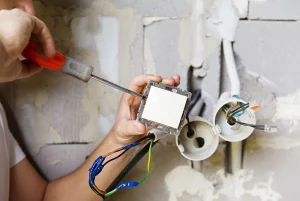When it comes to ensuring safety in design, strict adherence to common electrical code violations is crucial for preventing hazards. By diligently following the National Electrical Code (NEC) requirements, spaces can be protected from frequent violations that compromise safety.
Key issues include inadequate grounding, improper wire sizing, and overloaded circuits, all of which can pose significant risks if not addressed. Additionally, improper outlet placement or failure to use GFCI outlets in required areas are common mistakes that can lead to severe electrical issues. Understanding these violations and prioritizing code compliance ensures that both functionality and safety remain at the forefront of space design.
Key Takeaways
- Proper wire sizing and grounding techniques are crucial.
- Avoid violations like inadequate insulation and overloaded circuits.
- Ensure outlets are correctly spaced and placed for safety.
- Grounding and bonding are essential for preventing hazards.
- Thorough inspections and compliance with NEC standards are vital.
Understanding Electrical Code Basics
When it comes to understanding electrical code basics, a solid foundation in the regulations and standards set forth is essential for ensuring compliance and safety in any electrical installation. Familiarize yourself with NEC (National Electrical Code) requirements, including proper wire sizing, grounding techniques, and outlet placements.
Adherence to these standards guarantees a secure electrical system that meets industry guidelines and fosters a sense of belonging within the professional community.
Identifying Common Violations
Having a keen eye for detail is essential when it comes to identifying common electrical code violations in order to safeguard the safety and compliance of any electrical installation. Some common violations include improper grounding, inadequate wire insulation, overloaded circuits, and improper outlet spacing. These violations can pose serious safety hazards and must be rectified promptly to maintain the integrity of the electrical system.

Addressing Wiring Errors
Addressing wiring errors is a critical aspect of ensuring electrical systems meet safety standards and comply with regulations. Common wiring errors include improper wire sizing, inadequate grounding, and incorrect connections. These errors can lead to electrical fires, shocks, or equipment damage.
To address wiring errors, conduct thorough inspections, follow wiring diagrams meticulously, and seek professional assistance if uncertain. Proper wiring is essential for a safe and compliant electrical system.
Ensuring Proper Outlet Placement
The proper placement of outlets is essential to ensure an efficient and safe electrical system that adheres to regulatory standards.
- Outlets should be spaced no more than 12 feet apart along walls.
- Install outlets in kitchens at countertop level.
- Place outlets at least 18 inches above the floor in living rooms and bedrooms.
- Provide GFCI outlets in bathrooms, kitchens, and outdoor areas.
- Avoid placing outlets near water sources to prevent hazards.
Importance of Grounding and Bonding
Grounding and bonding are essential elements in securing the safety and proper functioning of electrical systems. Grounding provides a path for electrical currents to flow safely into the earth, preventing electrical shocks and fires. Bonding, on the other hand, connects conductive materials to guarantee a continuous path for fault currents, further enhancing safety. Proper grounding and bonding practices are critical to meet electrical code regulations and safeguard against hazards.
Frequently Asked Questions
Are There Specific Codes for Outdoor Electrical Installations?
Outdoor electrical installations must adhere to specific codes to guarantee safety and compliance. These codes dictate requirements for factors such as grounding, weatherproofing, and materials used. Consulting with a qualified electrician is vital for proper installation.
How Can I Prevent Overloading Electrical Circuits?
To prevent overloading electrical circuits, maintain proper distribution of power by balancing the load across circuits, avoid daisy-chaining extension cords, use surge protectors, and regularly inspect wiring for signs of wear or damage to sustain safe and efficient electrical systems.
Can I Install My Own Electrical Outlets and Switches?
Installing your own electrical outlets and switches can be risky without proper training and knowledge. It’s important to follow electrical codes to guarantee safety. Consider hiring a licensed electrician for professional installation to avoid potential hazards.
What Are the Consequences of Not Following Electrical Codes?
Not following electrical codes can lead to safety hazards, fire risks, property damage, and legal repercussions. Compliance guarantees safety, reliability, and functionality. It is important to adhere to regulations to protect occupants, property, and maintain operational efficiency.
Is It Necessary to Hire a Professional Electrician for Code Compliance?
Hiring a professional electrician for code compliance is essential to guarantee safety, efficiency, and adherence to regulations. Their expertise ensures proper installation, reduces risks of violations, and provides peace of mind for property owners.
Conclusion
To wrap up, creating safe spaces necessitates a thorough understanding of electrical codes to prevent common violations. By following NEC requirements, addressing wiring errors, ensuring proper outlet placement, and emphasizing grounding and bonding, spaces can be created with safety as a top priority. Attention to detail in identifying and correcting violations is essential to maintaining a compliant and secure electrical installation.
You May Also Like To Read:

